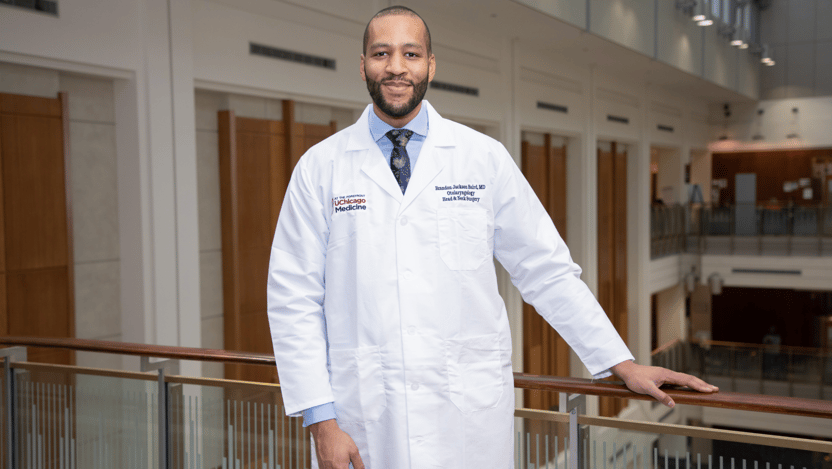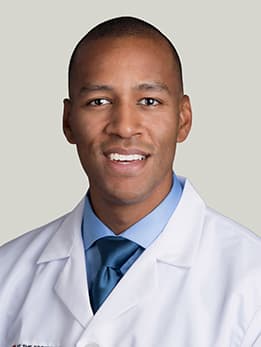Vocal cord surgery for rare tumor gives ABC7 anchor her voice back

Samantha Chatman noticed that her smooth, warm timbre was becoming increasingly hoarse.
The weekend morning anchor and investigative reporter for Chicago’s ABC7 initially thought the cause was her allergies or asthma. But after the hoarseness grew worse, she took the advice of her pastor in February 2024.
“He said, ‘You probably want to see an ear, nose and throat specialist to get that checked out,” Chatman said.
A scope passed through her nose revealed the cause: a polyp on her vocal cords.
Chatman’s doctor recommended she see the “Michael Jordan of vocal surgery,” aka University of Chicago Medicine otolaryngologist Brandon Baird, MD, to have it removed.
Baird cautioned Chatman that any polyp surgery would be followed by roughly three weeks of complete vocal rest. Chatman, an Emmy-winning journalist, had never taken more than a few days off, and she’d have to communicate via a text-to-speech app and a whiteboard.
“I wasn't thrilled with everything going on, but we had a plan,” Chatman said.
Chatman, a Hyde Park native, trusted Baird, and she was comforted by having a Black doctor — “someone who looks like you” — performing her surgery at the UChicago Medicine Center for Care and Discovery in April 2024.
‘You think it’s cancer?’
When Chatman awoke from surgery, she learned that the centimeter-large round mass was more serious than her care team initially thought.
“The mass had grown notably in those three weeks between our two preoperative office visits, and that’s very unlikely for a polyp,” Baird said. “While we were thinking it might be a mass, we didn’t know whether or not it was benign while we awaited the final pathology.”
Baird told Chatman it was important to meet with UChicago Medicine’s cancer team while awaiting the biopsy results.
Chatman wept; she couldn’t believe the news.
“I remember writing, ‘You think it’s cancer?’” she said.

Tests revealed a rare growth: an inflammatory myofibroblastic tumor, which has only been described in a handful of medical journals. But the tumor was benign, meaning the focus could shift from saving Chatman’s life to preserving her career by surgically removing the tumor without causing excess collateral damage.
“We were a little bit more at ease,” Baird said. “But the voice box is very important real estate, and millimeters matter when it comes to the vocal cords. You take an extra millimeter from the wrong part and you can have a permanently hoarse voice and scarred vocal cord for the rest of your life.”
A delicate tumor removal
On April 24, 2024, after a preoperative prayer with Chatman and her family, Baird used microsurgical instruments and a carbon dioxide laser to surgically remove the mass without damaging Chatman’s vocal cords.
“I woke up and he said that it went really, really well,” Chatman said. “He was smiling, so it was different from the first surgery.”
The recovery plan included voice rest for two months and avoiding foods that cause reflux, such as carbonated drinks and spicy foods. Chatman also limited her use of pain medication, despite initial soreness.
Her voice preserved, Chatman finally went back on air in June at ABC7, and she even shared her story on the Tamron Hall talk show in November.
Looking back, Chatman said remaining silent wasn’t all that bad.
“It gives you a lot of time to reflect, listen, observe and take in,” she said. “That period was a life-changing experience.”

Finding her voice again
With time and the help of monthly vocal therapy sessions, Chatman’s vocal cords are back to their normal function.
“She’s been able to get a higher part of her range back,” Baird said. “And she's been able to do her job, which is ultimately the goal.”
Still, Chatman does occasionally notice that she can become vocally fatigued after a long day. She isn’t sure if that's due to the tumor or whether she is now more aware of the health of her vocal cords.
Like Baird, she urges anyone who begins to experience a hoarseness that will not go away to get checked out by a doctor.
“Pay attention to your symptoms; you’ve got to put your health first and let the doctors do what they need to do, because everything else will fall into place,” Chatman said.

Brandon Baird, MD
Otolaryngologist Brandon Jackson Baird, MD, is a laryngeal surgeon specializing in a wide range of laryngeal diseases with an emphasis on medical and surgical management of voice and swallowing disorders.
Learn more about Dr. Baird